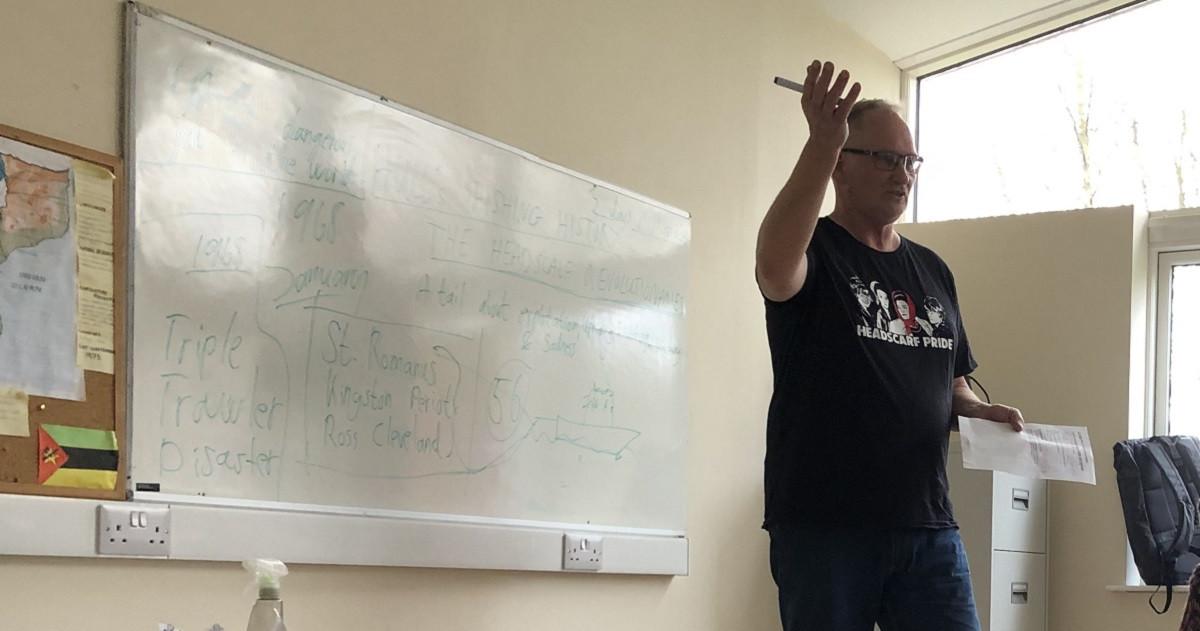By Melanie Pita, Team teacher
Hi, I am Mel and I am a teacher at CICD. Today I will be telling you about some of the studies of the second period of the 12 month programme and the students’ response to this.
The Forces that Run the World
In the beginning of February we have started the Poverty Activist 12 month programme. We are now about to finish our second period of The Forces that Run the World that has lasted for the past 4 weeks.
During this last 4 weeks we have studied and investigated Forces that Run the World to make our own conclusions, develop our insights and formulate founded opinions. Here are some of the topics: Imperialism, Capitalism, Surveillance Capitalism, Inequality, Human Rights, Media, Military, Money, International Institutions ie. NATO, Art advocating for Peace, People’s Movements.
The Headscarf Revolutionaries
I want to share a specific example of one of the courses the team has had: Headscarf Revolutionaries. I invited Rolf (another teacher who has a big passion for this topic) to give the course to the team.
The Headscarf Revolutionaries is about the 4 women who took radical action to protest against the dangerous fishing conditions in Hull and the UK and succeeded in making changes that saved thousands of lives. The fishing history tells the story of many many people. In the 60s Hull had the World largest Deep Sea Armada with 150 trawlers producing 25% of the UKs fishing.
The four women (Lillian Bilocca, Yvonne Blenkinsop, Chrissie Smallbone and Mary Denness) who were propelled to action in 1968, after three trawlers from Hull’s fleet sank in just three weeks in harsh seas, leaving 58 men and boys dead. In many ways this tragedy touched the heart of a city already struggling with poor and difficult conditions.
The fishing trawler industry was known to be brutal for ship workers, with no safety measures in place for the fishermen, bad fishing boats and no fully trained crews, which contributed to further mistreatment and a blatant disregard for the lives of the men who worked there.
“Enough is enough!” said Lillian Bilocca and together with the other 3 women and they changed the living conditions for many. This Women made a Fishermen’s Charter with the different demands for safety at seas, gathered 10.000 signatures, spoke out to the press, to the people, shout out to politicians and presented the Charter to the government. Standing firm, sure of what was right they did manage to get all the demands approved therefore changing the safety of thousands at sea.
When the learning reaches the heart
This is a very long story told in few paragraphs – a course that was lively and full of content about the strength of the People.
Why do I tell about this? Because something extremely nice, for me as a teacher, has happened. After this course the students had to summarise what they have learned and make both an informative pamphlet and a poster about it. They all did – beautiful art pieces full of content. I had one student that spend even more time looking for more information because the topic did agitated her curiosity and will to learn more – this is the kind of moments that I feel “YES!”. It simply is great.
But that is not just this. Besides the really great task she sent something else happened. Another student was having difficulties understanding some parts of the course and asked her for help. The first student sat down and explained it, not just what the course was about but also the “extras” she found out. This requires a high level of comradeship. This is the kind of small attitudes that make my heart beat fast for what I do. The second student task was the best task she ever sent (until now). Was full of content and understanding. This is thanks to the course itself of course but also for her team mate’s willingness to learn, teach and share.
The programme is much more than the curriculum!
The DI (Development Instructor) programme is not about the curriculum only. This is just a part of it.
The programme is about being in a team, co-operation leading to real development.
The reduction of the ego for the common goal.
The walking together instead of fast.
The learning from each other and “only reaching the goal when all reach the goal.
Feeling a course or a programme is successful is about having a team being a team and not a group of individuals in a classroom, each to their own thoughts. It is about common and the power of the collective.
Thank you for reading,
Mel
